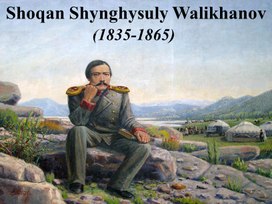Shoqan Shynghysuly Walikhanov given name Muhammed Qanafiya (November 1835 — April 10, 1865) was a Kazakh scholar, ethnographer, historian and participant of The Great Game. He is regarded as the father of modern Kazakh historiography and ethnography. The Kazakh Academy of Sciences is named after him.
He was born in November 1835 in the newly developed Aman-Karagaiskii district within the Kushmurun fort in what is nowadays the Kostanay Province of the Republic of Kazakhstan. Shoqan was a fourth generation descendant of the Ablai Khan, a khan of the Middle jüz. Shoqan's family was very respected by the government of the Russian Empire, and Walikhanov's father was awarded, during his life, six appointments as senior Sultan of Kushmurun okrug, a term as chief Kazakh advisor to the frontier board, a promotion to Colonel, and a separate term as senior Sultan in the Kokshetau okrug.
At an early age Shoqan moved from his father’s home to the estate of his paternal grandmother Aiganym, in Syrymbet. Shoqan was enrolled in the Siberian Cadet Corps by his grandmother.
Walikhanov entered the military academy in Omsk in 1847. After graduating from the Omsk Cadet School, where he read not only Russian but also English language literature.
His work combined military intelligence and geographic exploration. His first successful expedition was his 1855-56 mission to the region of Issyq Köl. He was afterwards called to the capital in St. Petersburg in 1857 to report, and there he was elected to the Russian Geographical Society.
On June 28, 1858, Walikhanov began the expedition that would lead him to instant fame throughout Europe and into the pages of history.
While still in Omsk, Dostoevsky had met Shoqan Walikhanov. In Dostoevsky's opinion, Walikhanov was a brilliant, intrepid person, a scholar and ethnographer, and a talented folklorist. In their correspondence, the two intellectuals admitted their great mutual love and admiration.
You write me that you love me. I will tell you without ceremony that I have fallen in love with you. Never, to anybody, not even to my own brother, have I felt such attraction as I do to you, and God knows how this has come about. One could say much in explanation, but why should I praise you! And you will believe in my sincerity even without proof, my dear Vali-khan, and even if one were to write ten books on this theme, one would write nothing: feeling and attraction are inexplicable
Fyodor Dostoevsky, 14 December 1856, Semipalatinsk
Walikhanov and Dostoevsky
When Dostoevsky served in Semipalatinsk, he met Walikhanov once again. The two men were also closely acquainted with renowned geographer Peter Semenov Tian-Shansky and Baron A. E. Wrangel, who came to Semipalatinsk from Petersburg in 1854 to serve as the new district prosecutor.
Dostoyevsky wrote from Semipalatinsk on 14 December 1856 one of his most enthusiastic letters ever, addressed to his friend Walikhanov:
There is a statue of Walikhanov and Dostoevsky in the city of Semey, Kazakhstan, near the local Dostoevsky museum.
Major Work
Walikhanov produced many articles and books devoted to the history and culture of Central Asia. A short list:
'Chinese Turkestan and Dzungaria' Walikhanov and other Russian travellers, The Russians in Central Asia, London, Edward Stanford, 1865.
Traces of Shamanism among the Kazakhs
Regarding the camps of Kazakh nomads
The Kazakhs
Walikhanov also compiled epic poetry, including "Kozy-Korpesh - Bayan-Sulu", as well as what he called the Iliad of the Steppe, the Epic of Manas.
Walikhanov's report of his trip to Kashgar in 1858-59 remains a valuable account on the situation in Xinjiang in the aftermath of Wali Khan's invasion of the region and on the eve of the Muslim Rebellion of the 1860s.
© ООО «Знанио»
С вами с 2009 года.
![]()


